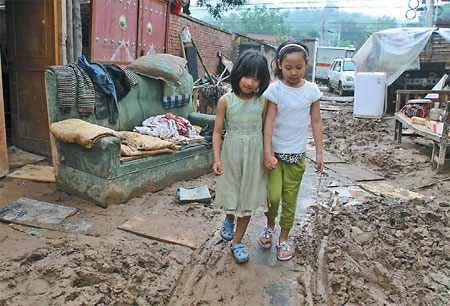Heavy storm left migrants in the lurch
Updated: 2012-07-27 08:04
By Peng Yining (China Daily)
|
||||||||
|
Seven-year-old Zhao Jingjing (left) and 10-year-old Li Jianing walk on the muddy road at Beicheying village, Beijing's Fangshan district, on Wednesday. Feng Yongbin / China Daily |
The 20-hour storm that hit Beijing on Saturday swept away the dreams of many migrant workers who came to the capital for opportunities.
In Beicheying village in Beijing's suburban Fangshan district, the hardest hit area over the weekend, Zhao Lupo and his family have been making a living for more than 20 years by carrying bricks in construction sites.
The 40-year-old has been dreaming of living a decent life that he wasn't able to pursue in his hometown in Anhui province by wheat farming.
To Zhao, "decent" means having a television, a refrigerator and a washing machine.
Now all those household appliances, together with all of Zhao's other belongings, furniture, clothes and the 3,000 yuan ($480) in cash he hid under his pillow, were washed away by the deluge.
The refrigerator he bought two months ago for 2,000 yuan was caked in mud. Zhao didn't even bother to clean it.
"It's a piece of garbage now," he said. "All efforts I put in over the past 20 years are now in a pile of garbage."
Zhao's wife, Zhang Wenping, said they still have hope for their children, a 7-year-old girl and a 6-year-old boy.
"We want our kids to grow up in Beijing. This is the main reason we moved here," said Zhang. "My husband and I are both illiterate. We can't even write our names, but our children will be educated in the capital."
She said during the downpour on Saturday, their daughter was scared.
"She cried and begged me to take her back to our hometown," the 34-year-old mother said. "But we have come so far. How can we give up everything and go back?"
Among the army of migrant workers in Beijing, a large number can't afford the expensive costs of living downtown so they dot the suburbs on the edge of the capital.
The 20-square-meter apartment for the family of four costs 50 yuan a month, compared with the 1,500 yuan average rent for an apartment of similar size downtown. Doing backbreaking work as bricklayers, Zhao's family can make 60,000 yuan a year, three times as much as they can earn at home.
Su Liping, a 52-year-old vegetable vendor from Shandong province, said most migrant workers in the village live together to take care of each other. In the village of 2,800 people, dozens of them have a small but close community.
On the stormy night, when the floodwater was up to his waist, Zhao guided his family to a safe place and went back to help neighbors.
"I heard them calling for help, so I broke down their door and pulled out a 63-year-old woman and a 10-year-old girl," he said. "I carried them on my back."
"Most of the locals have gone to live with their relatives, but we have no place to go," said Su. "Some of the villagers are kind and offer us food and water, but it won't last in the long term."
She and other migrant workers took shifts at night in case further downpours brought another flood. While off duty, she has to sleep on the cold, wet concrete floor in her soaked house.
The village's public shelter is not open to migrant workers. Relief supplies such as bottled water, instant noodles and blankets are also not available for people without Beijing hukou, or a permanent residence permit.
"This is so unfair. I have also contributed to the society," Su said. "I donated 200 yuan when the earthquake happened in Sichuan in 2008. We are all victims of natural disasters. Why do origins matter?"
However, Zhai Ruisheng, Party chief of the village, said people complained as supplies were limited but migrant workers had never been left out. As more materials are coming to the disaster area, all villagers, locals and migrant workers, have been given food and water.
According to the official, 260 of 1,400 households were badly damaged, but only 30 tents were built in a local primary school as shelters. But the local authority has never set a locals-only rule.
Liu Zhen, a 79-year-old villager and former village head, said it was just a misunderstanding between local residents and migrant workers. Some people had a little friction with migrants while distributing supplies, and someone called out "don't give supplies to people from other places".
Wang Wei, 54, who came from Heilongjiang province 14 years ago, was air-drying his daughter's college diploma, one of the few things they rescued from the debris.
His 24-year-old daughter recently found work as a secretary in Beijing and became the pride of the family.
"People always say there are more resources in the capital," Wang said. "We thought we would be well-protected and taken care of."
pengyining@chinadaily.com.cn

 Relief reaches isolated village
Relief reaches isolated village
 Rainfall poses new threats to quake-hit region
Rainfall poses new threats to quake-hit region
 Funerals begin for Boston bombing victims
Funerals begin for Boston bombing victims
 Quake takeaway from China's Air Force
Quake takeaway from China's Air Force
 Obama celebrates young inventors at science fair
Obama celebrates young inventors at science fair
 Earth Day marked around the world
Earth Day marked around the world
 Volunteer team helping students find sense of normalcy
Volunteer team helping students find sense of normalcy
 Ethnic groups quick to join rescue efforts
Ethnic groups quick to join rescue efforts
Most Viewed
Editor's Picks

|

|

|

|

|

|
Today's Top News
Health new priority for quake zone
Xi meets US top military officer
Japan's boats driven out of Diaoyu
China mulls online shopping legislation
Bird flu death toll rises to 22
Putin appoints new ambassador to China
Japanese ships blocked from Diaoyu Islands
Inspired by Guan, more Chinese pick up golf
US Weekly

|

|







